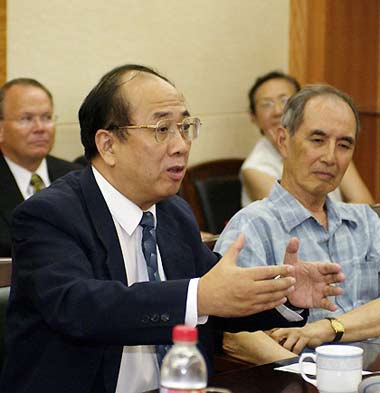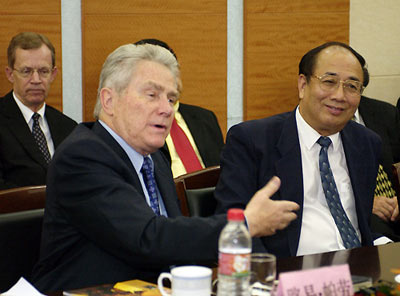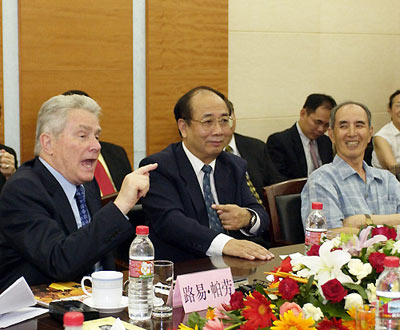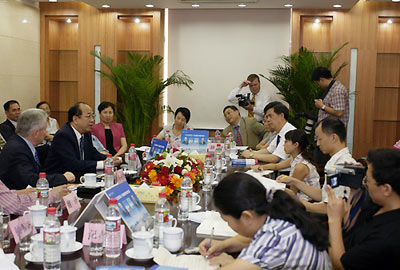| Tools: Save | Print | E-mail | Most Read |
| Religion Takes on Philosophy in New Tome |
| Adjust font size: |
Theologian and religious leader, Luis Palau, met with press in Beijing yesterday to discuss his latest book. Co-authored with Zhao Qizheng, former minister of the State Council Information Office, the book titled Riverside Talks: A Friendly Dialogue Between an Atheist and a Christian has been published in Chinese by the Beijing-based New World Press, a subsidiary of the China International Publishing Group. Based on a series of in-depth conversations between Palau and Zhao when the former paid a courtesy visit to Zhao in Shanghai in May 2005, the book was born out of the two men's differing views on the Bible. "I asked the minister about his comment on the Bible and was amazed by his answer, so I joked 'Let's write a book on this.' The minister took it seriously and we had altogether three discussions of over eight hours," quipped Palau. Palau and Zhao met on November 17, 2005 and signed a pledge to publish a book on their discussions in both English and Chinese. The Chinese version of the book was formally published today in Beijing with its contents weaving between philosophy, religion, science and culture. The two authors' topics of interest range from the Bible and the Analects of Confucius to the scientific theories of Newton and Einstein, and from ultimate concern to the "harmonious society." Speaking of his impression of the general atheists, Palau praised them as hard thinkers and as viewing life seriously. "I respected the minister who is an atheist. He is a thought-provoking, intelligent and philosophical man." Palau's co-author Zhao described the book as representing the inevitability for the need of "communication between different nations and cultures to get to know each other better." While both authors admitted they do not agree on all aspects in their discussions, they enjoyed and appreciated the frankness and mutual respect between each other. The publishing of this book showed that "you can disagree intellectually without insulting each other," said Palau. The book is the first of its sort in China and it testifies the extent of understanding, communication and goodwill existing between believers and atheists, and between different cultures. "Confrontation is not inherent for atheists and theists although they may disagree with each other," Zhao said. A decade ago, it would have beggared belief that a senior Chinese official might openly discuss this topic with a foreign religious leader. However, it is often the case that Chinese officials and scholars now like to open discussions on sensitive topics with people of different cultures, showing a culturally open society embracing diversity.
(China.org.cn by Wind Gu August 30, 2006) |
| Tools: Save | Print | E-mail | Most Read |
 |
| Related Stories |
|
| Product Directory China Search |
Country Search Hot Buys |



